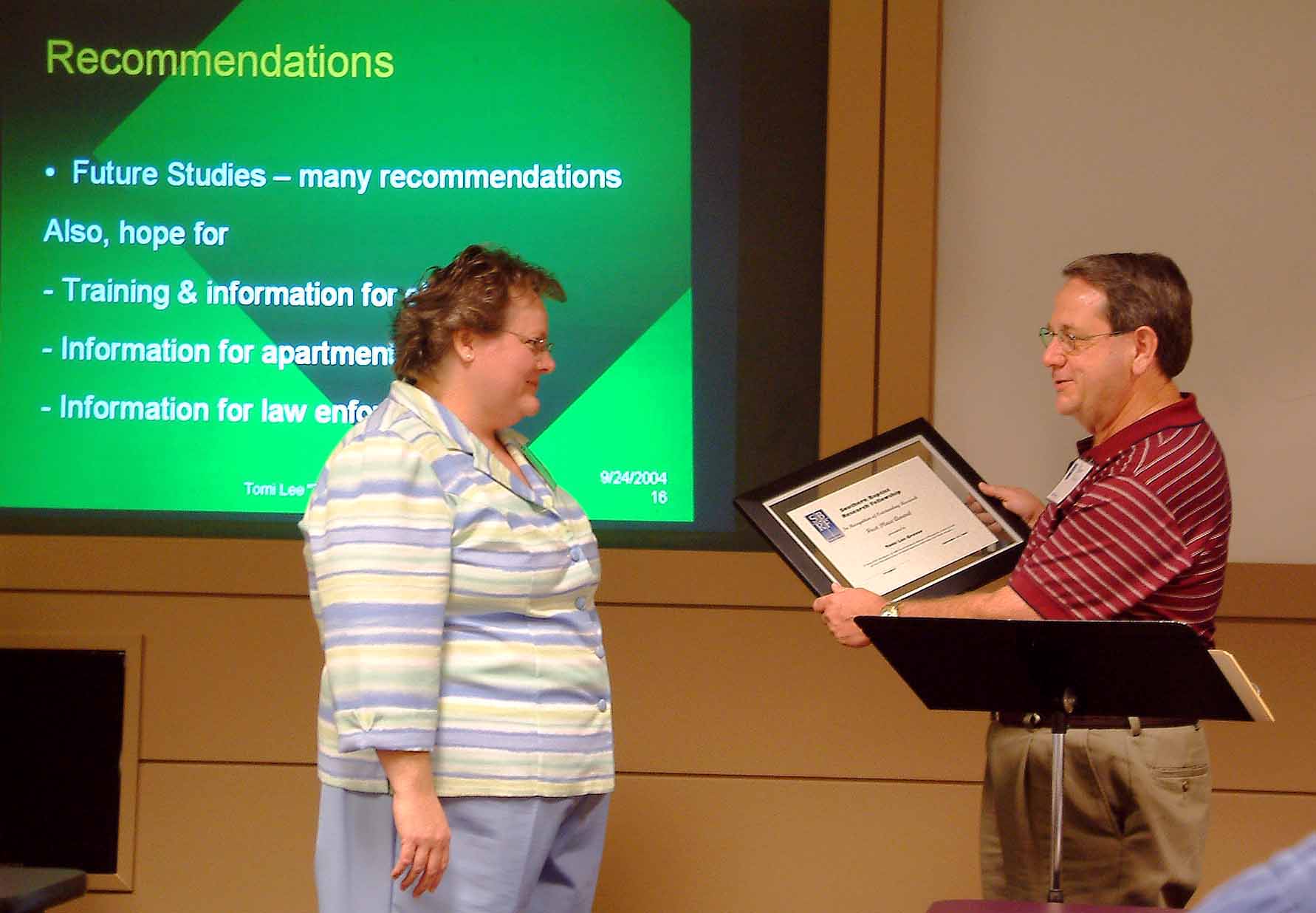
FORT WORTH, Texas (BP)–Southwestern Baptist Theological Seminary student Tomi Lee Grover says she was “flabbergasted” recently when she was recognized for having the best research project during a meeting of the Southern Baptist Research Fellowship.
Grover won for her work in assessing the impact that apartment ministry has with regard to crime reduction and crime reporting in apartment complexes in the Dallas-Fort Worth area.
Grover, a doctoral candidate in Southwestern Baptist Theological Seminary’s School of Educational Ministries, was awarded the fellowship’s outstanding research award during its Sept. 24 meeting in Alpharetta, Ga. The recipient for the competitive award is chosen from nominees from all six Southern Baptist seminaries.
Before the award was announced, Grover presented her paper and discussed its findings with the group. Her work was derived from a statistical method called “interrupted-time series design.” The method was developed for use in business studies and scientific analyses.
“When I got up to present my monograph,” Grover said, “I was reminded of Amos because I am not a statistician nor am I the ‘son’ of a statistician. I barely scraped by in Dr. Rick Yount’s statistics class, and here I was presenting a paper drawn from statistics in front of all these people who do research for a living. I was honored just to be invited.”
Concerned that crimes in low-income neighborhoods may often go unreported, Grover set out to determine whether the presence of an apartment ministry had any effect on the number of calls placed to law enforcement agencies.
Her conclusion was that apartment ministries have a measurable effect on increasing the rate at which crimes are called in to law enforcement agencies.
“The presence of the apartment ministry appears to provide an emboldened presence, much like neighborhood watch programs, in the ministry sites as compared to the control complexes,” her report concluded.
Grover’s interest in the nexus between ministry and crime prevention comes from the nearly 12 years she has spent in various aspects of law enforcement. Most recently, she has been a consultant in the restorative and criminal justice ministry of the Baptist General Convention of Texas. She also serves in church-based community ministries and acts as a victims advocate with the local law enforcement community. Her husband, Charles, is an officer with the seminary’s campus security division.
The methodology Grover used enabled her to analyze calls to law enforcement agencies over time and was the best model she knew of to interpret the data she needed to gather. But she said her study was made even more challenging because her academic advisory members had not had much exposure to the statistical method, either.
Bob Welch, dean of the school of educational ministries, collaborated with Grover throughout the process and spent long hours assisting her in understanding and applying the new methodology.
“Tomi is the type of graduate that we can look at with pride,” Welch said. “I am pleased that she was recognized for this achievement.”
Grover saw God working all the way through the process and even to the point of being able to go to the meeting. When she was invited to the SBRF meeting in Georgia, Grover did not have the money to go.
“The seminary was so gracious to me,” she said. When Welch, David McQuitty and other seminary administrators found out about her need, Grover said that “suddenly” there were anonymous donations that enabled her to buy an airplane ticket and stay in a hotel.
Grover is the second Southwestern Seminary education ministries doctoral student to win the award. In 2001, Terri Stovall won the award for her Ph.D. studies and monograph. Stovall is now assistant professor of adult education and aging at Southwestern. She also chairs the department of adult education and directs the women’s studies programs at the seminary.
“When they called my name, it didn’t register at first,” Grover said. “God gets all the glory, though, because this [study methodology] is my area of greatest weakness.”
–30–















